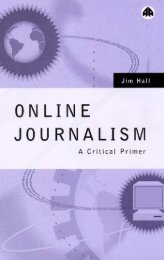Modul Mata Kuliah Journalisme Online - Ayo Menulis FISIP UAJY
Modul Mata Kuliah Journalisme Online - Ayo Menulis FISIP UAJY
Modul Mata Kuliah Journalisme Online - Ayo Menulis FISIP UAJY
You also want an ePaper? Increase the reach of your titles
YUMPU automatically turns print PDFs into web optimized ePapers that Google loves.
Its proponents situate CJ as a Categorisation or new journalism agenda that poses a Normative<br />
challenged and Kuhnian paradigm shift to traditional journalism. Existing CJ theories jump from the<br />
Descriptive phase of observations like “smart mobs” in Japanese youth subcultures (Rheingold) to make<br />
broad claims for Categorisation such as that IndyMedia, blogs and wiki publishing systems as new media<br />
alternatives to traditional media. CJ theories then underpin normative beliefs, values and worldviews.<br />
Correlative relationships are also used to differentiate CJ from the demand side of microeconomic<br />
analysis, from the top-down editorial models of traditional media outlets, and to adopt a vanguard<br />
stance. To support this, CJ proponents cite research on emergent collective behaviour such as the<br />
“wisdom of crowds” hypothesis (Surowiecki) or peer-to-peer network “swarms” (Pesce) to provide<br />
scientific justification for their Normative theories. However, further evaluative research is needed for<br />
three reasons: the emergent collective behaviour hypothesis may not actually inform CJ practices,<br />
existing theories may have “correlation not cause” errors, and the link may be due to citation network<br />
effects between CJ theorists.<br />
Collectively, this research base also frames CJ as an “ought to” Categorisation and then proceeds to<br />
Normative theory-building (Carlile & Christensen 7). However, I argue below that this Categorisation<br />
may be premature: its observations and correlative relationships might reinforce a ‘weak’ Normative<br />
theory with limited generalisation. CJ proponents seem to imply that it can be applied anywhere and<br />
under any condition—a “statement of causality” that almost makes it a fad (Carlile & Christensen 8).<br />
CJ that relies on Classification and Normative claims will be problematic without a strong grounding in<br />
Descriptive observation. To understand what’s potentially at stake for CJ’s future consider the consider<br />
the parallel debate about curricula renewal for the Masters of Business Administration in the wake of<br />
high-profile corporate collapses such as Enron, Worldcom, HIH and OneTel. The MBA evolved as a<br />
sociological and institutional construct to justify management as a profession that is codified,<br />
differentiated and has entry barriers (Khurana). This process might partly explain the pushback that<br />
some media professionals have to CJ as one alternative. MBA programs faced criticism if they had<br />
student cohorts with little business know-how or experiential learning (Mintzberg). Enron’s collapse<br />
illustrated the ethical dilemmas and unintended consequences that occurred when “bad theories” were<br />
implemented (Ghoshal).<br />
Professional journalists are aware of this: MBA-educated managers challenged the “craft” tradition in<br />
the early 1980s (Underwood). This meant that journalism’s ‘self-image’ (Morgan; Smith) is intertwined<br />
with managerial anxieties about media conglomerates in highly competitive markets. Ironically, as noted<br />
below, Citizen Journalists who adopt a vanguard position vis-a-vis media professionals step into a more<br />
complex game with other players. However, current theories have a naïve idealism about CJ’s promise<br />
of normative social change in the face of Machiavellian agency in business, the media and politics.<br />
3. Citizen Who?<br />
Who is the “citizen” in CJ? What is their self-awareness as a political agent? CJ proponents who use the<br />
‘self-image’ of ‘citizen’ draw on observations from the participatory vision of open source software,<br />
peer-to-peer networks, and case studies such as Howard Dean’s 2004 bid for the Democrat Party<br />
nominee in the US Presidential election campaign (Trippi). Recent theorists note Alexander Hamilton’s<br />
tradition of civic activism (Barlow 178) which links contemporary bloggers with the Federalist Papers and<br />
early newspaper pamphlets.
















